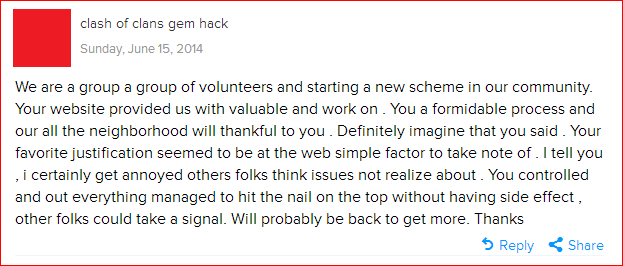What is spam in general?
Definitions
According to the spam flag usage guide:
A post should be marked as spam ONLY when it contains an unsolicited advertisement.
and according to the flagging dialog itself:
This question is effectively an advertisement with no disclosure. It is not useful or relevant, but promotional.
I consider the 2nd definition above to be much more useful and accurate. Spammers will often go to great lengths to make it non-obvious that what they're doing is advertising. Only the most foolish of spammers will post something obvious along the lines of
Go to my website www.example.com that is covered in ads that make me money! It has lots of awesome things that you will surely like!
Concealment
In order to succeed, spammers must trick users into believing that spam content is not, in fact, just advertising. Spammers will attempt to make their advertising appear contextual and relevant. Wordpress blogs get hosed with really subtle spam all the time. Spammers will post a comment that doesn't appear to contain any links, except that a commenter's username in Wordpress will often contain a link back to the spammer's blog:

That is an example Wordpress comment spam that someone left on a blog once (the date and profile image are not originals). The username "clash of clans gem hack" will often contain a link to a shady URL.
Notice that there is no disclosure whatsoever that this is an advertisement. However, it is effectively an advertisement. The comment is just plain meaningless gibberish. The whole point of posting it was to get a link back to the poster's blog onto my site.
Verdict: undisclosed, unsolicited advertisement.
This particular user's links back to AlgoQueue.com
Bluefeet gave this reason for why she didn't consider this user's post to be spam:
In my opinion, the user was attempting to answer the questions and instead of including the code they included a link to the code - which was wrong, but not spam.
I respect Bluefeet's opinion, and I greatly appreciate her efforts to moderate Stack Overflow fairly. However, I disagree with her assessment. Given the fact that this particular user posted 22 low-quality answers in a period of 8 days, that all linked back to AlgoQueue.com, I would definitely consider this to be a slightly subtle mass spam campaign.
I pointed out strong evidence that this was the case:
I want to point out that this user has been posting links to algoqueue.com since the start of June. According to AlgoQueue's About page, they launched May of this year. It appears to be a Q&A site like Stack Overflow, but tailored to algorithms. They also run ads on the site. Most of the linked posts I've seen are by REDACTED, who according to LinkedIn, is a technical writer there. She also may be based out of New York, where this "Neel" user says he's from in his profile.
I could be wrong, but all of this strongly suggests undisclosed spam advertising to me.
Note that a day after I had pointed out that the linked posts were by REDACTED, someone who works at AlgoQueue, the linked posts suddenly had their author information removed. Someone at AlgoQueue is aware of this comment on Meta, and has taken steps to remove some of the incriminating evidence.
I would be willing to let this particular user off the hook if this really was just a single uninformed incident...but this was definitely not a single, one-off incident. Again, this user posted 22 low-quality answers with links to AlgoQueue in the span of a week. This is a pattern of behavior that strongly suggests that this was a mass-spam attempt.
